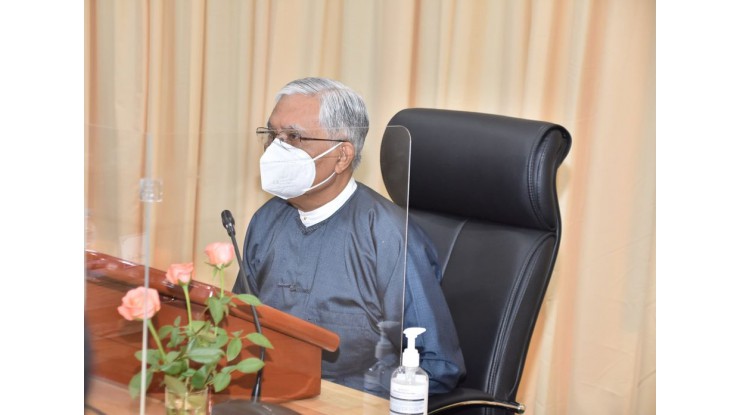အမျိုးသားအဆင့် အဂတိလိုက်စားမှုတိုက်ဖျက်ရေး မဟာဗျူဟာရေးဆွဲရေး ဦးဆောင်ကော်မတီ၏ ပထမအကြိမ်အစည်းအဝေး (Virtual Format)၌ ပြောကြားသော အဂတိလိုက်စားမှုတိုက်ဖျက်ရေးကော်မရှင်ဥက္ကဋ္ဌ၏ အမှာစကား
- Mon, 26 October 2020

၂၀၂၀ ပြည့်နှစ် အောက်တိုဘာလ (၂၀) ရက်
၁။ မင်္ဂလာပါ။ ပထမအကြိမ်အစည်းအဝေးမှာ ဦးဆောင်ကော်မတီအဖွဲ့ဝင်များ စုံညီစွာ တက်ရောက်လာကြသည့် အတွက် အထူးကျေးဇူးတင်ပါသည်။
၂။ တစ်နိုင်ငံလုံး ကျယ်ပြန့်စွာဖြစ်နေသော အဂတိလိုက်စားမှုပြဿနာများကို ကော်မရှင်က ပြီးခဲ့သည့် (၃) နှစ်တာအတွင်း အစွမ်းကုန်ကြိုးစားတိုက်ဖျက်ခဲ့သော်လည်း နေရာအနည်းငယ်တွင် အဂတိလိုက်စားမှု ရပ်တန့်သွားခြင်း၊ နေရာတချို့တွင် လျော့နည်းကျဆင်းသွားခြင်းများ ဖြစ်စေခဲ့သော်လည်း နေရာများစွာ၌မူ ယခင်အတိုင်း အခြေအနေမပျက်ရှိနေသေးသည်ကို တွေ့ရှိနေရပါသည်။ အကြောင်းရင်းကတော့ တစ်နိုင်ငံလုံးအတိုင်းအတာဖြင့်ပါဝင်မှုရှိပြီး ထိရောက်စွာ ပေါင်းစပ်ညှိနှိုင်းထားသော အဂတိလိုက်စားမှုတိုက်ဖျက်ရေးမူဝါဒတစ်ရပ်ကို ပီပြင်စွာ မဖော်ဆောင်နိုင်ခဲ့သည့်အတွက် ဖြစ်တယ်လို့ ကော်မရှင်က သုံးသပ်ရရှိပါသည်။ ၂၀၁၈ ခုနှစ်က ကော်မရှင်မှရေးဆွဲခဲ့သော ၂၀၁၈-၂၀၂၁ အဂတိလိုက်စားမှု တိုက်ဖျက်ရေးမဟာဗျူဟာသည် ၈၅ % ခန့်အထိ အောင်မြင်စွာအကောင်အထည် ဖော်ဆောင်ပြီးဖြစ်ခဲ့သော်လည်း အဂတိလိုက်စားမှုတိုက်ဖျက်ရေးအတွက် အများ ပြည်သူဆိုင်ရာအဖွဲ့အစည်းများ၊ စီးပွားရေးလုပ်ငန်းများအပါအဝင် ပြည်သူလူထု တစ်ရပ်လုံးကို တခဲနက်ပါဝင်လာအောင် မစွမ်းဆောင် နိုင်ခဲ့ပါဘူး။ ဒါကြောင့် မြန်မာနိုင်ငံအနေဖြင့် ထောင်စုနှစ်ရည်မှန်းချက်များကို ပြည့်မှီနိုင်ဖို့အတွက်ဆိုလျှင် နိုင်ငံတော်အစိုးရအနေဖြင့် အဂတိလိုက်စားမှုတိုက်ဖျက်ရေးကို နိုင်ငံရေး စိတ်စေတနာအရင်းခံဖြင့် ဦးဆောင်လမ်းညွှန်ဖော်ဆောင်မှု ပြုလုပ်သွားနိုင်ရန်အတွက် အမျိုးသားအဆင့် အဂတိလိုက်စားမှုတိုက်ဖျက်ရေးမဟာဗျူဟာတစ်ရပ်သည် မရှိမဖြစ်လိုအပ်နေပါသည်။
၃။ အောက်တိုဘာလ(၉)ရက်နေ့က နိုင်ငံတော်သမ္မတရုံးက မိမိဦးဆောင်သော အမျိုးသားအဆင့် အဂတိလိုက်စားမှုတိုက်ဖျက်ရေး မဟာဗျူဟာရေးဆွဲရေး ဦးဆောင်ကော်မတီတစ်ရပ်ကို မဏ္ဍိုင်သုံးရပ်စလုံးမှ လုပ်ပိုင်ခွင့်ရှိသူများဖြင့် ပါဝင်ဖွဲ့စည်းပေးထားခဲ့ပြီးဖြစ်သဖြင့် ပြင်ဆင်ခြင်း၊ ဖွဲ့စည်းခြင်း၊ ရေးဆွဲခြင်း ကိစ္စရပ်များကို ယနေ့မှစတင် ဆောင်ရွက်သွားကြမှာဖြစ်ပါသည်။
၄။ ဒီနေ့အစည်းအဝေးတွင် ကျွန်တော့်အနေဖြင့် အမျိုးသားအဆင့် အဂတိလိုက်စားမှု တိုက်ဖျက်ရေး မဟာဗျူဟာကိုရေးဆွဲရာတွင် အလေးအနက်ထား စဉ်းစားသင့်သည့် အချက်နှစ်ချက်ကို တင်ပြလိုပါတယ်။ ပထမအချက်ကတော့ အမျိုးသားအဆင့် အဂတိလိုက်စားမှုတိုက်ဖျက်ရေး မဟာဗျူဟာဆိုတာ တာဝန်ရှိသူတွေက စိတ်ဆန္ဒရှိလျှင် ရှိသလို၊ မရှိလျှင် မရှိသလို လိုက်နာအကောင်အထည် ဖော်လည်းရ၊ အကောင်အထည်မဖော်လည်းရသည့် နည်းပညာဆိုင်ရာ စာရွက်စာတမ်းတစ်ခုမျှသာ မဖြစ်စေရပါဘူး။ အမျိုးသားအဆင့် အဂတိလိုက်စားမှုတိုက်ဖျက်ရေး မဟာဗျူဟာ ရေးဆွဲရတဲ့ရည်ရွယ်ချက်တစ်ခုက ထိပ်ပိုင်းခေါင်းဆောင်များ၏ စိတ်စေတနာရှိမှု၊ ပြည်သူလူထု၏လိုလားတောင်းဆိုမှုနှင့် ကျယ်ပြန့်သောအားပေးထောက်ခံမှုတို့ကို ဖြစ်ထွန်းပေါ်ပေါက်စေလျက် ယင်းအရှိန်အဟုန်ကို တစ်နိုင်ငံလုံးအတိုင်းအတာဖြင့် ဖြစ်ပေါ်နေတဲ့အဂတိလိုက်စားမှုများကို ထိရောက်စွာတိုက်ဖျက်ရာတွင် ပင်မ မောင်းနှင်အားအဖြစ် တာရှည်တည်တံ့ခိုင်မြဲစွာ အသုံးပြုသွားနိုင်ရန်ဖြစ်ပါတယ်။ ဒါကြောင့် မဟာဗျူဟာတစ်ရပ်ဟာ ထူးခြားထက်မြက်သောမူဝါဒများ ဖော်ပြထား ရုံမျှဖြင့် ရည်မှန်းချက်ကိုမရောက်နိုင်ပါဘူး။ အစိုးရအဖွဲ့များအတွင်းမှာသာမက အစိုးရပြင်ပမှပုဂ္ဂိုလ်များ၊ အဖွဲ့အစည်းများကပါ ဤမဟာဗျူဟာအပေါ် ပိုင်ဆိုင်မှုနှင့် ကတိကဝတ်ပြုမှုတို့ ပါရှိရမှာဖြစ်ပါတယ်။ ဒါကြောင့်ကျွန်တော်တို့က လုပ်ငန်း ကော်မတီများကိုဖွဲ့စည်းတဲ့အခါမှာ ကျယ်ကျယ်ပြန့်ပြန့်ပါဝင်စေသင့်သလို စံနှုန်းသတ်မှတ်ချက်များနှင့်အညီ စနစ်တကျစုစည်းမှုလည်းဖြစ်ရန် လိုအပ်မှာဖြစ်ပါသည်။
၅။ ဒုတိယအချက်ကတော့ မဟာဗျူဟာရေးဆွဲသူများဟာ အလိုဆန္ဒကြီးလွန်းမှုနှင့် အခြေမပျက် အရှိအတိုင်းလက်ခံလိုမှုဟူသော အစွန်းတရားနှစ်ပါးစလုံးကို ရှောင်ရှားနိုင်ရန်လိုအပ်ပါမယ်။ စိုးရိမ်ကြောင့်ကြမှုနဲ့ ကန့်သတ်မှုများလွန်းသော မဟာဗျူဟာသည် ကျယ်ပြန့်သော သို့မဟုတ် နက်ရှိုင်းသောအဂတိလိုက်စားမှုများကို မနှိမ်နင်းနိုင်၊ မတားဆီးနိုင်ဘဲ လွယ်လင့်တကူရနိုင်သော ရလဒ်တချို့ကိုသာ ဖော်ဆောင်ပေးနိုင်မှာ ဖြစ်ပါတယ်။ တချိန်တည်းမှာပဲ အလိုဆန္ဒကြီးမားသောမဟာဗျူဟာသည်လည်း နိုင်ငံ၏အရင်းအမြစ်နှင့် လူသားစွမ်းဆောင်ရည်တို့က လိုက်မမှီသဖြင့်လည်းကောင်း၊ အင်အားကြီးမားသောစိန်ခေါ်မှုများစွာကို မကျော်လွှားနိုင်၍လည်းကောင်း၊ ရည်မှန်းချက်အတိုင်း ဖြစ်မြောက်နိုင်စွမ်းမရှိ၊ လက်တွေ့မကျသောကြောင့် နောက်ဆုံး၌ ပြည်သူလူထု၏ ယုံကြည်မှုဆုံးရှုံးခြင်းနှင့် စိတ်ပျက်ခြင်းတို့သာ အဖတ်တင်ကျန်ရစ်နိုင်ပါသည်။ ထို့ကြောင့် မဟာဗျူဟာအဆင့်တိုင်းတွင် ဆန္ဒနှင့် အရှိတရားအကြားမှာ မှန်ကန်သောမျှခြေကိုတွေ့အောင်ရှာဖွေပြီး စံချိန်မီ၍ လက်တွေ့ကျသောရလဒ်များ ပေါ်ပေါက်စေရေးအတွက်သာ ဦးစားပေး ပြုစုပေးကြပါရန်နှင့် နိုင်ငံတော်အတွက် အရေးကြီးသောပြုပြင်ပြောင်းလဲမှုတစ်ရပ် ဖြစ်သဖြင့် အားလုံးတက်ညီလက်ညီ ပူးပေါင်းပါဝင်ပေးကြပါရန်တင်ပြရင်း နိဂုံးချုပ်အပ်ပါသည်။







